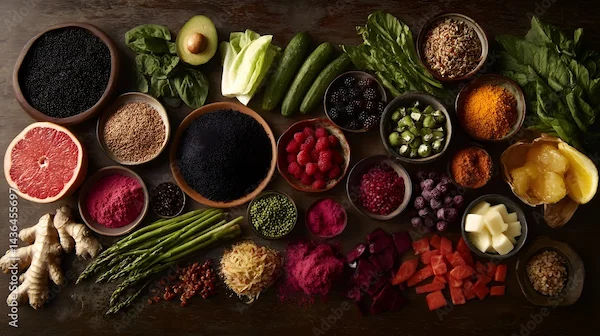Good Fats Explained: Understanding the Benefits of Healthy Fats
Discover the benefits of healthy fats, including monounsaturated and polyunsaturated fats. Learn about their sources, advantages for heart and brain health, and how to balance them in your diet.

Written by
Last updated on 3rd Jul, 2025
Introduction
In the ever-evolving world of nutrition, the subject of dietary fats often sparks debate and confusion. However, not all fats are created equal. While some fats can be detrimental to health, others play a crucial role in promoting overall well-being. Understanding the differences between good fats and bad fats can empower you to make informed dietary choices that support your health goals. In this comprehensive article, we’ll explore the world of good fats, their benefits, sources, and how they can be incorporated into a balanced diet.
What Are Good Fats?
Good fats, also known as healthy fats, are essential for your body’s proper functioning. These fats provide energy, support cell growth, protect organs, and help absorb essential nutrients. Good fats are primarily classified into two main types: monounsaturated fats and polyunsaturated fats.
Monounsaturated Fats: These fats are found in foods like olive oil, avocados, nuts, and seeds. Monounsaturated fats are known for their ability to reduce bad cholesterol levels (low-density lipoprotein or LDL) while maintaining or increasing good cholesterol levels (high-density lipoprotein or HDL). They also help improve insulin sensitivity and support heart health.
Polyunsaturated Fats: This category includes omega-3 and omega-6 fatty acids, which are essential fats that the body cannot produce on its own. Omega-3 fatty acids are particularly beneficial for brain function, reducing inflammation, and supporting heart health. Omega-6 fatty acids, while also essential, should be consumed in moderation to maintain a healthy balance with omega-3s.
The Benefits of Good Fats
Incorporating good fats into your diet offers numerous health benefits. Here are some key advantages of consuming healthy fats:
Heart Health: Good fats help reduce the risk of heart disease by lowering bad cholesterol levels and increasing good cholesterol levels. They also help maintain healthy blood pressure and reduce the risk of arrhythmias (irregular heartbeats).
Brain Function: Omega-3 fatty acids, found in fatty fish and flaxseeds, are crucial for brain health. They support cognitive function, memory, and mood regulation. Consuming adequate omega-3s has been linked to a reduced risk of neurodegenerative diseases such as Alzheimer’s.
Inflammation Reduction: Chronic inflammation is a key factor in many diseases, including heart disease, diabetes, and arthritis. Omega-3 fatty acids have anti-inflammatory properties that help reduce inflammation and support overall health.
Weight Management: Including healthy fats in your diet can promote satiety and reduce the likelihood of overeating. Fats are more calorie-dense than carbohydrates and proteins, so they provide sustained energy and help control appetite.
Nutrient Absorption: Certain vitamins, such as vitamins A, D, E, and K, are fat-soluble, meaning they require fat for proper absorption. Consuming good fats helps ensure that your body can absorb and utilise these essential nutrients effectively.
Skin Health: Healthy fats contribute to maintaining the integrity of cell membranes, which is important for healthy skin. They help keep the skin hydrated, supple, and resilient to environmental stressors.
Sources of Good Fats
Incorporating good fats into your diet is essential for maintaining overall health and well-being. Good fats, including monounsaturated and polyunsaturated fats, can be found in a variety of delicious and nutritious foods. Here are some excellent sources of good fats:
Monounsaturated Fats
Olive Oil: A staple of the Mediterranean diet, olive oil is rich in monounsaturated fats and antioxidants. It can be used for cooking, salad dressings, and drizzling over vegetables.
Avocados: Avocados are a versatile source of monounsaturated fats, fibre, and various vitamins and minerals. They can be added to salads, sandwiches, smoothies, or enjoyed on their own.
Nuts: Nuts such as almonds, cashews, and macadamia nuts are packed with healthy fats, protein, and fibre. They make for convenient and nutritious snacks or additions to meals.
Seeds: Seeds like pumpkin seeds, sunflower seeds, and sesame seeds are rich in monounsaturated fats, as well as essential minerals and vitamins. They can be sprinkled over salads, yoghurt, or added to baked goods.
Nut Butter: Natural nut butter, such as almond butter and peanut butter, are excellent sources of monounsaturated fats. Ensure you choose varieties without added sugars or hydrogenated oils.
Polyunsaturated Fats
Fatty Fish: Fatty fish, such as salmon, mackerel, sardines, trout, and herring, are excellent sources of omega-3 fatty acids. Aim to include fatty fish in your diet at least twice a week for optimal health benefits.
Flaxseeds: Flaxseeds are rich in alpha-linolenic acid (ALA), a type of omega-3 fatty acid. They can be added to smoothies, oatmeal, or baked goods. Ground flaxseeds are easier to digest and provide more health benefits than whole flaxseeds.
Chia Seeds: Chia seeds are another great source of ALA and can be used in a variety of dishes. They can be sprinkled on cereals, mixed into yoghurt, or used to make chia seed pudding.
Walnuts: Walnuts are high in omega-3 fatty acids, making them an excellent addition to a healthy diet. They can be eaten as a snack, added to salads, or used in baking.
Soybeans and Tofu: Soybeans and tofu are rich in polyunsaturated fats, including both omega-3 and omega-6 fatty acids. They are also good sources of plant-based protein and can be included in a variety of dishes.
Canola Oil: Canola oil is a versatile cooking oil that contains a good balance of omega-3 and omega-6 fatty acids. It can be used for sautéing, baking, and salad dressings.
Sunflower Oil: Sunflower oil is high in omega-6 fatty acids and can be used for cooking and baking. Opt for high-oleic sunflower oil, which contains more monounsaturated fats and is more stable for cooking.
Corn Oil: Corn oil is another source of omega-6 fatty acids and can be used for frying and baking. It’s important to balance omega-6 intake with omega-3s to maintain a healthy ratio.
Balancing Fats in Your Diet
While incorporating good fats into your diet is important, it’s equally crucial to maintain a balance and avoid overconsumption of bad fat. Here are some tips for balancing fats in your diet:
Limit Saturated Fats: Saturated fats, found in animal products like red meat, butter, and full-fat dairy, should be consumed in moderation. High intake of saturated fats is associated with an increased risk of heart disease.
Avoid Trans Fats: Trans fats, commonly found in processed and fried foods, are harmful to health. They raise bad cholesterol levels and increase the risk of heart disease. Always check food labels and avoid products containing partially hydrogenated oils.
Focus on Whole Foods: Prioritise whole, unprocessed foods that naturally contain healthy fats. Avoid processed foods that may contain hidden unhealthy fats and additives.
Incorporate Variety: Include a variety of sources of good fats in your diet to ensure you’re getting a broad spectrum of nutrients. Mix and match different types of nuts, seeds, oils, and fish to keep your meals interesting and nutritious.
Practice Portion Control: While healthy fats are beneficial, they are also calorie-dense. Be mindful of portion sizes to avoid excessive calorie intake, which can lead to weight gain.
Conclusion
Good fats are an essential component of a healthy diet, offering numerous benefits for heart health, brain function, inflammation reduction, weight management, nutrient absorption, and skin health. By understanding the different types of healthy fats and their sources, you can make informed dietary choices that support your overall well-being. Remember to balance your fat intake, limit saturated and trans fats, and prioritise whole, unprocessed foods. With a mindful approach to nutrition, you can enjoy the advantages of good fats and maintain a healthy, vibrant lifestyle.
Consult Top Dieticians
Consult Top Dieticians
Ms Malabika Datta
Dietician
19 Years • Bsc (Clinical Nutrition & Dietetics), Msc (Dietetics & Food Service Management)
Kolkata
Malabika’s Diet Clinic, Kolkata

Neelanjana J
clinical nutrition
3 Years • Bsc., Msc. Nutrition and Dietetics.
Bengaluru
Apollo Clinic, JP nagar, Bengaluru

Dr Darshana R
General Physician/ Internal Medicine Specialist
15 Years • MBBS, MD, DNB (Internal Medicine), Diploma in Allergy, Asthma and Immunology , Fellowship in Diabetes
Bengaluru
Apollo Clinic, JP nagar, Bengaluru
(100+ Patients)
Ms Chetu Singhi
Dietician
20 Years • MSC Dietetics & Nutrition
Kolkata
RB Diagnostic - Dietician Diet2fit Chetu Singhi, Kolkata

Ms. Shereen Begum
Dietician
8 Years • BSC Food Science & Management, Msc (Nutrition & Dietetics)
Hyderabad
Dr Shereen clinic, Hyderabad

